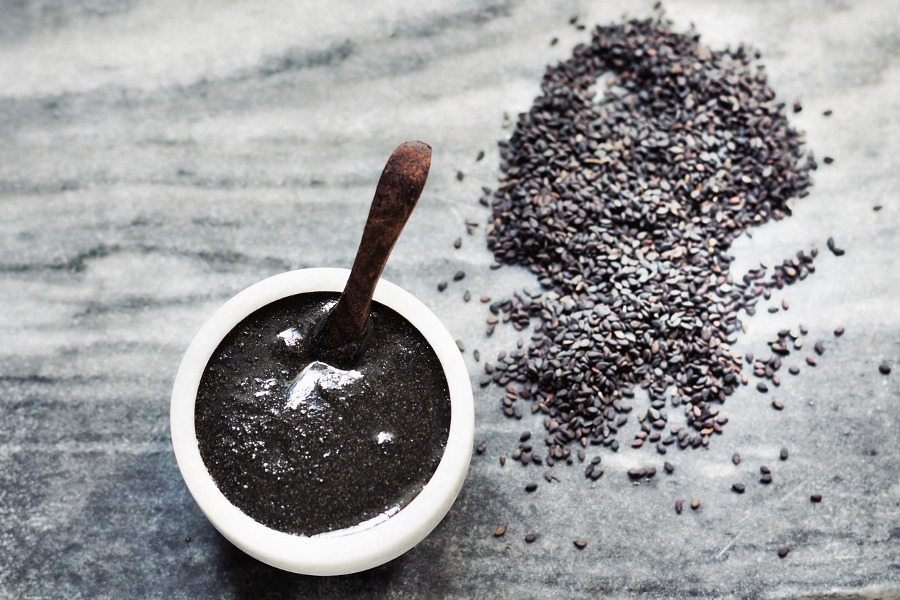


Ibn al-Qayyim, the noted Muslim scholar stated that the principles of sound health are three:
–preservation of good health
–removal of harmful substances from the body and
–keeping the body away from harm.
In a modern context this equates to eating wholesome nutritious foods, ensuring balance of quality and quantity, keeping away from things that are toxic and harmful to the body (and in modern society there are many), and striving to detoxify the body from the consequences of bad diet and lifestyle and exposure to harmful elements.
This article will examine aspects of natural healing from the Sunnah of the Prophet Muhammad (peace be upon him).
Black Seed (Habba-tu Sawda) – Black cumin, fennel flower
Abu Huraira (may Allah be pleased with him), narrated that Allah’s Messenger ( peace be upon him) said: “Use this black seed regularly, because it has a cure for every disease except death.” (Reported by Bukhari.)
The Black seed is the common fennel flower plant (Nigella sativa) of the buttercup family. This herb grows to about 16-24 inches and has finely divided foliage with blue flowers. From this plant, comes a small black seed, which is also known as the blessed seed or black seed, and some call it the Arabian seed because of its habitat. The Black Seed plant is also known by other names, and they vary between places. The Black Seed has been used for over two thousand years. It has been said that the Black Seed should be used regularly because it has a cure for every disease except death.
A special oil is extracted from the seed which is used in the preparation of various medical formulas. It has been used to treat bronchitis and coughs. Also it has been used to help increase body tone, as a digestive tonic, to quell belching, stimulates excretion of urine, dissolves wind, quells colic pain and stomach-gas colic, expels worms, benefits some skin allergies, stimulates menstrual period, and increases the flow of breast milk. If you add a few drops to coffee or tea it can help calm the nervous system, help pertussis, dry cough, asthma, and bronchial respiratory complaints. If you take the Black Seed oil unmixed or undiluted it can produce gripe, and irritate the digestive system. The Black Seed acts as an expectorant by stimulating the body’s energy and helping it to recover from fatigue and dispirtedness. (Medicine of the Prophet)
SIDE EFFECTS
Black seed is a safe and effective herb that can be used by almost anyone. No irritations or side effects are caused when the right dose is correctly applied. Its benefits are obtained through consistent use, the effects are medium to long term. Black seed can be used in the treatment of diabetes mellitus or diabetes caused by an allergy, but it is recommended that the treatment be supervised because Black seed lowers blood sugar levels. Black seed should not be taken by pregnant women.
NUTRITIONAL COMPONENTS
Black seed contains over 100 valuable nutrients. It is comprised of approximately 21% protein, 38% carbohydrates, and 35% plant fats and oils. The active ingredients of black seed are nigellone, thymoquinone, and fixed oils. Black seed also contains significant proportions of protein, carbohydrates and essential fatty acids. Other ingredients include linoleic acid, oleic acid, calcium, potassium, iron, zinc, magnesium, selenium, vitamin A, vitamin B, vitamin B2, niacin, and vitamin C.
The black seed is known in Arabic as the habbutual barakah (the seed of blessing).
Dates
Dates were the food that Allah provided for Mary after she gave birth to Prophet Jesus under the palm tree. Allah inspired Jesus, her blessed infant, and his future messenger to the children of Israel, in one of the early miracles of his birth to say to her: “Shake the trunk of the palm-tree, and it will drop ripe dates on you, so eat, drink, and comfort your eyes (with what Allah gave you) (Qur’an 19:25).
Abdullaah bin Ja’afar reported that he saw Prophet Muhammad ( peace be upon him) eating fresh ripe dates with cucumber (Bukhari and Muslim). Sometimes he also ate a couple of fresh dates with a drink to sweeten it. He also used to eat a couple of fresh dates for his morning breakfast and before attending fajr prayers. When he did not find fresh dates he ate dried ones.
Fresh dates stimulate sexual desire, increases semen, balances the constitution of people with cold temperament, and in general is extremely healthy and rich in benefits for the body, particularly where it is the staple fruit of the land. For those who are not used to eating it, fresh dates will break down and putrefy rapidly in the stomach, and they will generate excessive heat and boiling of the blood, causing extreme headache and imbalance of the black bile, and damaging the teeth, hence requiring balancing and adjustment of the humors through either food of cold temperament or through purgation. (Medicine of the Prophet)
It is also reported that Allah’s Messenger ( peace be upon him) sometimes ate dates with butter, bread, or alone. Dried dates are moist in the first degree. Many of the benefits of eating dates are prominent for the dwellers of hot climates. As for the dwellers of cold climates, particularly those who are not used to it, eating dates immoderately can cause glaring of the eyes, headache, and damage teeth. These adverse effects can be overcome by eating almonds and poppies. (Medicine of the Prophet)
Honey
“honey, in it there is a cure for people.” – Qur’an 16:69,
Hot Lemon and Honey
Take the juice of a lemon and squeeze a few tablespoons into a cup. Add a tablespoon of raw, pure honey. Then cover with boiling water. Stir it and then sip it. There is a cure in honey and lemon is a cleanser and a purifier. This mixture is great for sore throats, colds, or just as a general pick me up. Enjoy!
Did You Know?
If the value of lemons was more known, they would be worth $1.00 each. Lemons are very useful in both health and sickness. Hot lemonade is one of the best remedies for an incipient cold. It is also excellent in cases of biliousness. Lemon syrup, made by baking a lemon 20 minutes then squeezing the juice upon half a cupful of sugar, is excellent for hoarseness and to break up a cold.
Honey is the natural nectar and concentrated sweetness of flowers converted by bees to a golden rich syrup. The sour of nectar the honey is made from determines its color and flavor, and the best is the light-colored variety of honey. The best honey is unadulterated by beekeepers, and is collected from mountainous areas and trees. It is then strained and has most of the impurities removed, except for some pollen and enzymes. Honey is produced by the worker honeybee who sucks flower nectar with its tongue like glossa and stores the nectar in its honey stomach. The bee regurgitates the honey and either stores it in cells or feeds drones. Honey has the ability to absorb and retain moisture, and is an excellent food preservative, and certain varieties of honey are used in treating wounds. (Medicine of the Prophet) Honey should be excluded from the diet of children under the age of one as they are more prone to develop botulism.
Honey contains 35 percent protein (one-half of all the amino acids), and is considered to be a complete food. It is highly concentrated source of essential nutrients, containing large amounts of carbohydrates (sugars), the B-complex vitamins, vitamins C, D, and E, and some minerals. It is used to promote energy and healing. Two tablespoons daily is sufficient. It is twice as sweet as sugar and therefore not as much is needed. Only unfiltered, unheated, unprocessed honey should be purchased.
Diabetics and hypoglycemics should be careful when consuming honey and its by-products. The blood sugar reacts to these substances as it would to refined sugars. However, tupelo honey contains more levulose than any other honey and is absorbed at a slower rate so many hypoglycemics can use this type sparingly. (Prescription for Natural Healing, Balch, J. M.D., and Balch,P.A., C.N.C.)
Honey is a natural source of energy that also offers a unique combination of nutritional benefits. Sugars are the fundamental unit of energy for our bodies. All carbohydrates, whether simple sugars or complex carbohydrates, must be broken down to glucose, or blood sugar, before our bodies can use them as energy. The sugars in honey are primarily glucose and fructose and although the body absorbs them in different manners, both provide the body with quick energy. Recent studies suggest that this unique mixture of sugars which occurs naturally in honey, works best in preventing fatigue and enhancing athletic performance.
For a quick source of energy and to reap the benefits of honey’s healthful properties, make honey part of your daily diet along with plenty of fruits and vegetables. Add honey and fresh fruit to low-fat yogurt for an energy-sustaining snack or stir a spoonful of honey into a glass of water before your daily workout.
Olive Oil (Zayt Zaytun)
The olive tree is a blessed one in the Qur’an and an olive branch symbolizes a peace offering. Olive oil is extracted from the ripe fruit of the olive tree of the Oleaceae family. Its native climate is the Mediterranean basin, and its habitat extends throughout the Middle East and Southern Europe, and is found in the North African countries of Morocco and Tunisia as well. (Medicine of the Prophet).
Abu Huraira narrated that Allah’s messenger ( peace be upon him) said: “Use olive oil as food and as ointment, for it comes from a blessed tree.” (Reported by Imam al-Tirmithi.)
Drinking olive oil benefits in the treatment of food poisoning, moves the bowels, and expels intestinal worms. All kinds of oil soften the skin, and slow down the hair graying process. The salted water of preserved olives benefits skin burns, prevents blistering, strengthens the gums, and is good for herpetiform eruptions, and some allergic skin conditions. (Medicine of the Prophet).
Source: https://muslimvillage.com/2018/10/14/3903/natural-healing-from-the-sunnah/